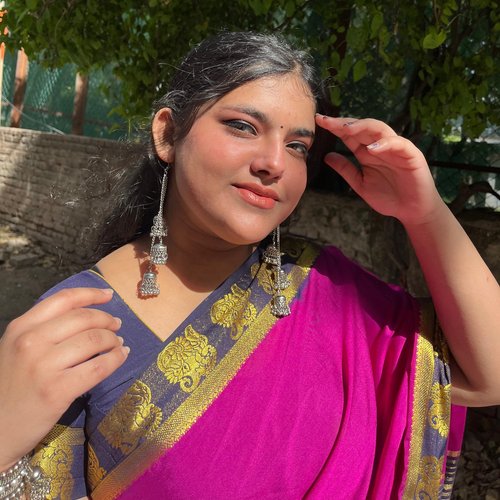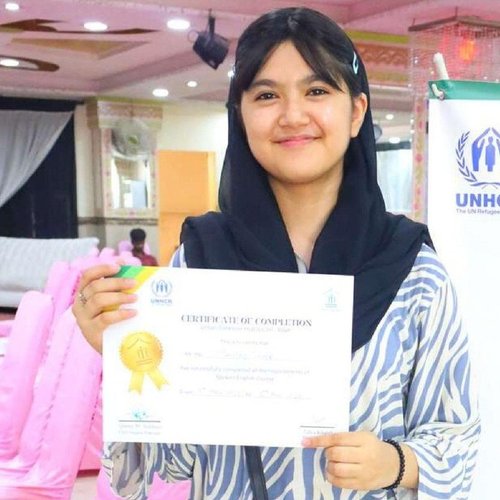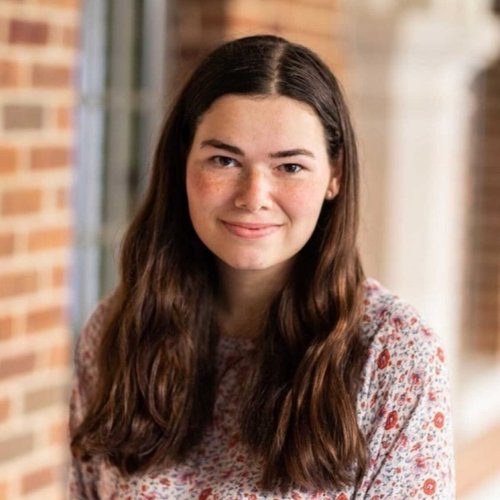Betty Shitahun, 25, reflects on her journey as a deaf rights activist in Ethiopia and how she's carved out space for girls just like her with Roots and Wings ELIXIR, a Malala Fund-supported organisation.
24-year-old Halima Yusuf reflects on how her mother’s story of being taken out of school inspired her to pursue her education and is the reflection of the realities of many girls in Nigeria today. When girls are excluded from decision-making tables where their lives are shaped, they suffer. This piece is expanded from Halima’s address to Nigerian policymakers at a Malala Fund Nigeria organised an International Day of the Girl event in Abuja last week.
For International Day of the Girl, Malala talks with two Malala Fund Fellows, Dr. Ayesha Kareem and Tamilore Omojola, about their work in co-leading Girls’ Vision for Education and what keeps them inspired as fellow activists.
Can you point to the moment you knew you were an activist? 25-year-old Laurine can. Advocating for students' needs in university sparked her commitment to creating inclusive spaces that reflect student needs and inspired her to join the Girls ‘ Vision steering committee, helping girls around the world map out their dreams for their education. Laurine shares why she joined Girls’ Vision for Education, her takeaways, and why the voices of young women should be the driving force behind education policy.
Hear what girls are demanding from world leaders at the Summit of the Future.
From becoming a tailor to teaching other girls in secret, Afghan girls share their lives under Taliban rule.
September 15 marks the three-year ban on girls' education in Afghanistan. We asked Erin Hung, an illustrator and storyteller, to depict the lives and wishes of Afghan girls — and the result is one of a kind.
26-year-old Tamilore, a Malala Fund Girl Fellow, writes about the first time she learned about climate change, how it spurred an interest in climate education and how girls in her community led the charge on climate-friendly waste disposal — changing her hometown for the better.
Nadia reflects on what it meant to be a first-generation college graduate as a daughter of Sudanese refugees.
16-year-old Manal writes about taking matters into her own hands when she opened a library in a small town in Pakistan — with the help of a local bookstore owner: the Faimah Asif Library.
13-year-old Nayab reflects on how being a mentor for younger children in the Seekho Sikhao Saathi programme from Cities for Children — an organisation supported by Malala Fund — helped her realise she wanted to be a child welfare lawyer.
Amid fear and uncertainty, here’s what is keeping young women hopeful about their education and future three years after the Taliban took control of Afghanistan.
Have you ever wondered what it would be like if Malala visited your school for a day? 15-year-old Sara writes about just that — the day Malala sat with Harrow High School in London to discuss everyone’s role in creating a world where all girls are free to learn and pursue their dreams.
Malala makes it an annual tradition to meet girls all around the world on her birthday. This year, she visited Harrow High, a secondary school in London, to speak to Afghan girls about their journey to the U.K. and their hopes for girls in Afghanistan. The girls and their classmates also brainstormed ways to support Afghan girls who have been banned from school for more than 1,000 days. Meet three girls who shared their stories at this year’s Malala Day event.
20-year-old climate activist, Hania Imran, reflects through a poem, about her disillusionment while attending COP28 during the bombardment of Gaza at the end of 2023.
Amina*, a 15-year-old Afghan student, interviews her dad about his role in her education, their hopes for Afghan girls’ future and what Father’s Day means in a country where girls cannot attend secondary school.
19-year-old Guncha reflects on the first time she learned about ecofeminism, a term referring to the relationship between woman and nature and the shared history of oppression. She writes about the legacy of ecofeminism in India and why the history is important for girl activists.
Interested in climate fiction but don’t know where to start? 28-year-old Sanjana Sekhar, one of nine finalists of Grist's Imagine 2200 climate fiction writing contest, discusses climate fiction, intergenerational relationships, and using storytelling for advocacy.
14-year-old Dilawaiz writes about how the gift of a bicycle led her on a transformative journey of resilience and empowerment.
14-year-old Mahtab reflects on the generosity of people in Pakistan towards her and other families from Afghanistan seeking refuge.
20-year-old Ilana writes about how a brave letter from girls in her school set her on a path to combating gender-based discrimination throughout college.




















